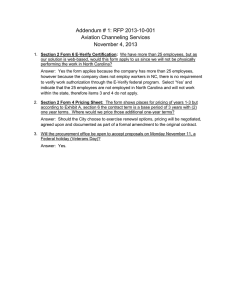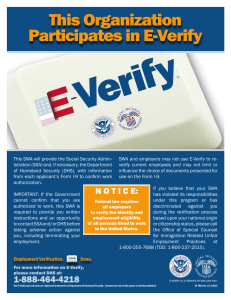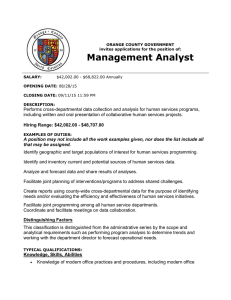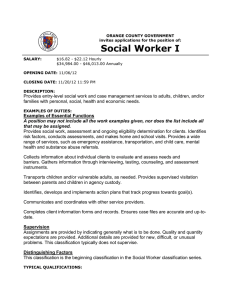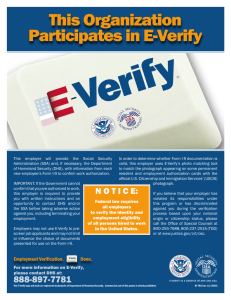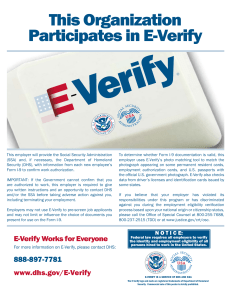Pennsylvania Contractors to Ring in the Verification Requirements
advertisement
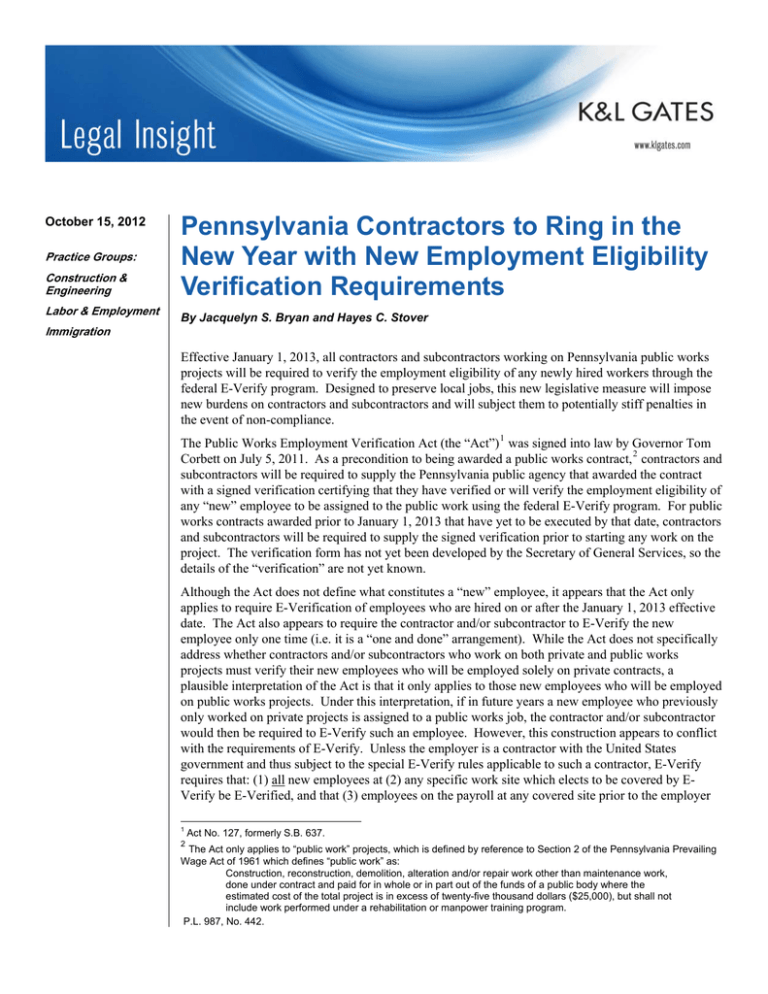
October 15, 2012 Practice Groups: Construction & Engineering Labor & Employment Pennsylvania Contractors to Ring in the New Year with New Employment Eligibility Verification Requirements By Jacquelyn S. Bryan and Hayes C. Stover Immigration Effective January 1, 2013, all contractors and subcontractors working on Pennsylvania public works projects will be required to verify the employment eligibility of any newly hired workers through the federal E-Verify program. Designed to preserve local jobs, this new legislative measure will impose new burdens on contractors and subcontractors and will subject them to potentially stiff penalties in the event of non-compliance. The Public Works Employment Verification Act (the “Act”) 1 was signed into law by Governor Tom Corbett on July 5, 2011. As a precondition to being awarded a public works contract, 2 contractors and subcontractors will be required to supply the Pennsylvania public agency that awarded the contract with a signed verification certifying that they have verified or will verify the employment eligibility of any “new” employee to be assigned to the public work using the federal E-Verify program. For public works contracts awarded prior to January 1, 2013 that have yet to be executed by that date, contractors and subcontractors will be required to supply the signed verification prior to starting any work on the project. The verification form has not yet been developed by the Secretary of General Services, so the details of the “verification” are not yet known. Although the Act does not define what constitutes a “new” employee, it appears that the Act only applies to require E-Verification of employees who are hired on or after the January 1, 2013 effective date. The Act also appears to require the contractor and/or subcontractor to E-Verify the new employee only one time (i.e. it is a “one and done” arrangement). While the Act does not specifically address whether contractors and/or subcontractors who work on both private and public works projects must verify their new employees who will be employed solely on private contracts, a plausible interpretation of the Act is that it only applies to those new employees who will be employed on public works projects. Under this interpretation, if in future years a new employee who previously only worked on private projects is assigned to a public works job, the contractor and/or subcontractor would then be required to E-Verify such an employee. However, this construction appears to conflict with the requirements of E-Verify. Unless the employer is a contractor with the United States government and thus subject to the special E-Verify rules applicable to such a contractor, E-Verify requires that: (1) all new employees at (2) any specific work site which elects to be covered by EVerify be E-Verified, and that (3) employees on the payroll at any covered site prior to the employer 1 2 Act No. 127, formerly S.B. 637. The Act only applies to “public work” projects, which is defined by reference to Section 2 of the Pennsylvania Prevailing Wage Act of 1961 which defines “public work” as: Construction, reconstruction, demolition, alteration and/or repair work other than maintenance work, done under contract and paid for in whole or in part out of the funds of a public body where the estimated cost of the total project is in excess of twenty-five thousand dollars ($25,000), but shall not include work performed under a rehabilitation or manpower training program. P.L. 987, No. 442. Pennsylvania Contractors to Ring in the New Year with New Employment Eligibility Verification Requirements signing up for E-Verify at that site cannot be E-Verified. It is unclear under the E-Verify regulation whether each site of public work would be considered a separate work site for E-Verify purposes. Thus, it would appear prudent for contractors and subcontractors who work on both private and public works contracts to E-Verify all of their employees who are hired on or after January 1, 2013. The federal E-Verify program is run by the U.S. Department of Homeland Security (“DHS”). EVerify is an internet-based system which provides instant verification of work authorization. Before a company can start using E-Verify, it must enroll in the program by providing basic information about the company and agreeing to follow the rules of the program. Once enrolled, a contractor/subcontractor can use E-Verify to verify the employment eligibility of its employees using a three-step process: Step 1: The contractor/subcontractor will “create a case” using the information provided by the employee on its Employment Eligibility Verification form (I-9 form), and will be guided through a series of questions which follow the I-9 form, including the employee’s citizenship, documentation type, and biographical information (such as date of birth, social security number and/or alien or I-94 number); Step 2: E-Verify will generate a response in approximately three to five seconds. If “Employment Authorized” is returned, the contractor/subcontractor will be guided to the last step. If another response is returned, such as “DHS Verification in Process” (meaning the DHS needs to manually search its files which can take up to 24 hours) or “Tentative Nonconfirmation” (employee information does not match government records), additional steps must be taken by the contractor/subcontractor; and Step 3: Once a final verification result is received, all E-Verify cases must be “closed” by the contractor/subcontractor so that E-Verify can maintain statistics on program usage and outcomes. 3 The Act will be enforced by the Pennsylvania Department of General Services, which is entitled to conduct complaint-based or random audits of public works contractors and subcontractors for compliance with the Act. The Act imposes harsh penalties for contractors and subcontractors who: (1) fail to verify the employment eligibility of a new employee through the federal E-Verify program, (2) do not provide the verification form required by the Act, or (3) make a false statement or misrepresentation in the verification form. The following chart provides a summary of the possible violations and penalties: Employers that fail to verify the employment eligibility of a new employee on or after January 1, 2013 through the E-Verify program: First Offense Warning letter is issued and non-compliance is posted on the Department of General Services of the Commonwealth of Pennsylvania’s website. Second Offense Mandatory thirty (30) day debarment from state public works contracts. 3 U.S. Department of Homeland Security, Citizenship and Immigration Services, available at http://www.uscis.gov/portal/site/uscis/menuitem.eb1d4c2a3e5b9ac89243c6a7543f6d1a/?vgnextoid=d4abfb41c8596210V gnVCM100000b92ca60aRCRD&vgnextchannel=d4abfb41c8596210VgnVCM100000b92ca60aRCRD. 2 Pennsylvania Contractors to Ring in the New Year with New Employment Eligibility Verification Requirements Third Offense At least one hundred and eighty (180) days or up to one (1) year debarment from state public works contracts. Willful 4 violation Willful violators may be debarred from state public works contracts for up to three (3) years. Failure to provide the verification form or the making of a false statement or misrepresentation on the verification form Possible imposition of civil penalty of $250 to $1,000 for each violation. Violations that occur ten years or more after a prior violation shall be deemed to be a first violation, and violations by a contractor or subcontractor involving a single public works contract shall be considered a single violation despite the number of employees that are the subject of the violations. The Act provides “good faith immunity” to contractors and subcontractors who rely in good faith on the E-Verify program in order to verify employment eligibility of new employees. Although contractors and subcontractors are not responsible under the Act for any violation of the Act by their own subcontractors, contracts between a public works contractor or subcontractor and its subcontractors must contain information about the requirements of the Act. Contractors and subcontractors are barred from retaliating or discriminating against an employee who: (a) participates in an investigation, hearing or inquiry of an alleged violation, and/or (b) reports a complaint regarding a violation under the Act. An employee who is unlawfully retaliated or discriminated against under the Act is entitled to sue for reinstatement and restitution of up to three times the amount of the employee’s wages and fringe benefits calculated from the date of the retaliation or discrimination, 5 and recover reasonable attorneys’ fees and costs. The purpose behind the Act is to preserve local jobs and ensure that local Pennsylvania workers “are not displaced or kept in the unemployment lines because of cheap labor that isn’t legally permitted to be here or work here.” 6 Pennsylvania House and Senate Representatives tried unsuccessfully for six years to enact this legislation. 7 The Act received significant criticism from the American Civil Liberties Union of Pennsylvania, likely fueled by its adamant opposition to the federal E-Verify system which it views as “the start of a national identification system.” 8 However, one Pennsylvania legislator has made clear that the Act is not designed to “target[] illegal workers,” but rather to 4 “Willful” is defined by the Act to include “action or conduct undertaken intentionally or with reckless disregard for or deliberate ignorance of the requirements and obligations established under this Act.” 5 The employee’s action must be brought within one hundred and eighty (180) days from the date the employee knew of the retaliation or discrimination. 6 See Lorraine McCarthy, Pennsylvania Governor Signs Bill Requiring Contractors to Verify Employment Eligibility, Bloomberg BNA, Daily Labor Report, July 11, 2012 (citing statement by S.B. 637 Sponsor Senator Kim Ward (R)). 7 See id. (noting that a House version of this bill was introduced in 2012, and two similar bills were introduced in two previous legislative sessions). 8 See id. (citing statement by Andy Hoover, Legislative Director of the American Civil Liberty Union of Pennsylvania). See also American Civil Liberties Union of Pennsylvania, “Governor Signs Bill to Mandate E-Verify National ID System for Public Contractors, Says ACLU of PA,” http://www.aclupa.org/pressroom/governorsignsbilltomandate.htm 3 Pennsylvania Contractors to Ring in the New Year with New Employment Eligibility Verification Requirements “target[] the contractors who use and abuse them for profit.” 9 Similar legislation has been enacted by a number of other states. Conclusion The Act will present new responsibilities and challenges for Pennsylvania contractors and subcontractors working on public works projects. The enrollment process is intricate and close attention must be paid while completing the verification process. Although the E-Verify website provides guidance for ensuring proper enrollment with the E-Verify program, 10 contractors and subcontractors should consult immigration legal counsel to ensure that they have taken all of the necessary steps to: (1) properly enroll in the E-Verify program, (2) ensure that newly hired employees are being properly verified under the E-Verify program, and (3) ensure that verification forms are being timely and properly submitted to the Pennsylvania public agency on the public works project. In addition to the harsh penalties imposed by the Act, failure to comply with the Act will stymie the progress and development of public works contracts and cause contractors and subcontractors to incur additional costs, as no work can begin on the projects until the Pennsylvania public agency that awarded the contract receives the requisite signed verification. Pennsylvania contractors and subcontractors that work on public works projects should begin now to take the necessary steps to ensure they will be in a position to comply with the Act by the New Year. Authors: Jacquelyn S. Bryan jackie.bryan@klgates.com +1.412.355.8678 Hayes C. Stover hayes.stover@klgates.com +1.412.355.6476 9 See id. (citing statement by Rep. John Galloway (D)). U.S. Department of Homeland Security, Citizenship and Immigration Services, available at http://www.uscis.gov/portal/site/uscis/menuitem.eb1d4c2a3e5b9ac89243c6a7543f6d1a/?vgnextoid=0a18fb41c8596210V gnVCM100000b92ca60aRCRD&vgnextchannel=0a18fb41c8596210VgnVCM100000b92ca60aRCRD. 10 4

